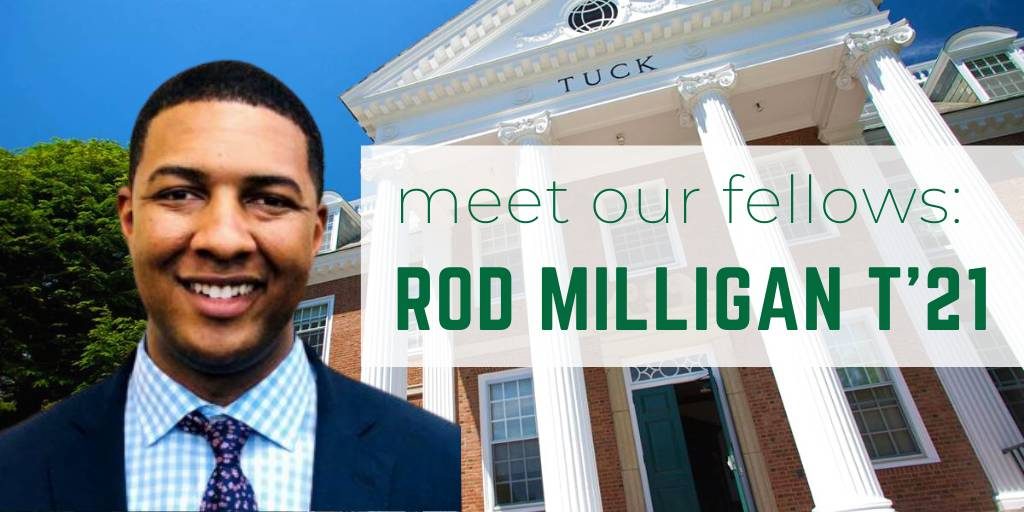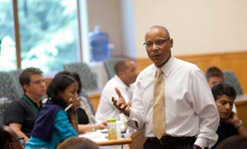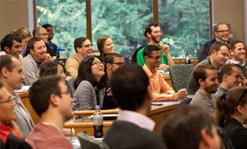Meet Our Fellows: Rod Milligan T’21
December 18th, 2020

Name
Roderick Milligan T’21
Hometown
Augusta, Georgia (same as James Brown and Laurence Fishburne!)
What did you do prior to Tuck?
Drilling and Completion Engineer at Chevron. I began my career working a rig and then started designing wells for drilling.
Why did you choose Tuck?
There were a few things that drew me to Tuck.
- The close knit community that also warmly welcomes families and partners (TPs). Another part that was attractive to me about Tuck was a dedicated center to digital transformation, the CDS. When I was looking at business schools, Chevron was going through their own digital transformation, and at the time I didn’t fully understand what it meant for an organization to undergo a digital transformation and be able to focus on data to drive that change. Tuck’s strong core, plus co-curricular centers like the CDS and the Associates and Fellows programs were attractive.
- I liked the size of Tuck. I went to a small school for undergraduate, Tuskegee University, which has about 3,000 students, including the graduate schools. The tight-knit fabric I enjoyed at Tuskegee also seemed present at Tuck.
Do you have any post-Tuck plans yet? What are they?
I’ll be returning to Apple as a Global Supply Manager. I interned with Apple in the summer as a member of the optical and depth projector team. When I graduate from Tuck, my family and I will move to Cupertino, CA, or a nearby town. It’s a great opportunity, and I’m excited about meeting new people, developing a new network in California, and really just taking in a new experience out west.
What made you want to be part of the CDS MBA Fellows program?
As I was researching business schools to apply to, I came across the CDS website. I specifically remember reading the white paper that CDS Fellow Marcus Morgan T’19 wrote on The Barriers to Cloud Gaming. I had had the opportunity to meet Marcus during Admitted Students Week and remembered his white paper on gaming. He and I talked about his transition from gaming companies like EA and Activision Blizzard to Tuck and ultimately to Microsoft’s Xbox Game Studios. Marcus mentioned to me that researching and writing that paper really helped him when he was recruiting at Microsoft. Seeing another black male at Tuck do that type of work, get traction from it, and ultimately chart his own path was really appealing.
After that experience, I realized that if the CDS can provide these types of opportunities, I want to be a part of that. Coming from Chevron, I really wanted to understand how legacy organizations can better handle digital transformation and use data to better understand the business and use it to capitalize on opportunities.
What is the best part about being involved with the CDS?
A few things stand out:
The CDS Alumni Fellow community is outstanding. They’re openness to sharing their experiences and giving you confidence that the CDS helped them not just on their initial job search and sourcing but throughout their careers and how it helps them still today. CDS Alumni is a group that is constantly reaching out, giving back, and constantly learning.
I’ve loved learning from CDS Executive Director Patrick Wheeler and my co-fellows. Each of us come to the center from different backgrounds (marketing, sales, engineering, etc) and in these interactions, I’ve learned a ton about digital and where digital transformation is today and where it is going. I’ve been especially amazed at how much I’ve learned from the marketers in our group. It is one discipline that has really tapped into how data can transform operations and serves as a blueprint for other disciplines. It’s crazy to see how much data is underutilized in other areas of some organizations. Other functions can lean into this and use data the way marketing has.
Finally, I will say the small lessons we learn as a group, having healthy discussions around these topics, and sitting down in real life (which I miss!), conversing about an array of topics really expanded my knowledge about how companies are making use of data and technology today.
What other activities are you involved in at Tuck?
I serve as the Diversity and Inclusion Chair for T’21s and T’22s. I’m also on the search committee for the first Senior Vice President for Chief Diversity Officer at Dartmouth. As a member of this committee, I am working with President Hanlon and the Dartmouth Board of Trustees to find the best person for this job.
I am also actively involved in programming for Diversity, Equity, and Inclusion at Tuck.
When I was interviewing for Tuck, the last question I was asked was “What will your legacy at Tuck be?” At that point, I hadn’t put much thought into my Tuck legacy and I said I needed to think about my answer.
After some reflection, I came back to my ongoing involvement with Tuskegee. While I was still at Chevron, I was involved with the Advisory Board for the Engineering Department at Tuskegee as a rep from Chevron and was also the lead recruiter for Chevron at the university. In that program, I was able to garner $250k annually from Chevron to give to Tuskegee ($50k went to scholarships, $200k went to maintain a Chevron Lab). Chevron was trying to recruit students from Tuskegee to go into oil and gas, which isn’t always an easy sell. My career at Chevron was challenging and fulfilling, and I wanted to share a similar opportunity to the next generation of Tuskegee students.
Remembering the impact I was able to have at my undergrad alma mater, I realized I wanted my Tuck legacy to connect historically black colleges to Tuck, creating a pipeline where we can have a pool of diverse candidates coming to Tuck. Today, I’m proud to say that I’m working with the Tuck Admissions team to set up a program to look at historically black colleges for recruitment to bring diverse candidates to Tuck.
What has been the biggest growth moment for you or moment where you stepped out of your comfort zone? What did you learn from that experience?
After the Ahmaud Arbery murder, there was a lot of conversations happening, and a lot of assumptions that people think it is easy to talk about these types of issues within their own communities. Honestly, though, I didn’t feel that way. I had trouble talking about it. But, I knew it was an important conversation to have, so shortly after his murder, I–along with the Black Students at Tuck (BSAT) group–set up an Ask Me Anything (AMA) which was open to the whole school. It was really well received, and I was able to talk about my own experience being a black man. In talking with and organizing the AMA with the BSAT, I think people left knowing that Ahmaud Arbery was no different from me or our black classmates. Being part of this larger dialogue helped me grow as a leader.
The timing of the AMA turned out to be really critical. Just a few months later, when George Floyd was murdered, it seemed like it was easier to have these really difficult discussions around race in America at Tuck.
When the Tuck Allies through Leadership and Knowledge TALK) reached out to me about putting together a summer reading program to promote empathy and action through community learning, I suggested Michelle Alexander’s The New Jim Crow: Mass Incarceration in the Age of Colorblindness.
I believe that the earlier AMA settled everyone into the conversation, got me out of my own comfort zone, and empowered my classmates to feel more comfortable talking about these topics.
What speaker(s) have you learned the most from in your time at Tuck?
 Laura Scott T’03, COO of Takeoff Technologies, was the most impactful during the 2019 Tech Conference. She really appealed to me, because she made it to the C-suite after a career in Ops, which is where I’m heading. It was great to see there’s a pathway from Ops to large leadership roles that don’t directly come from something like product management. It really opened my eyes to the number of opportunities out there.
Laura Scott T’03, COO of Takeoff Technologies, was the most impactful during the 2019 Tech Conference. She really appealed to me, because she made it to the C-suite after a career in Ops, which is where I’m heading. It was great to see there’s a pathway from Ops to large leadership roles that don’t directly come from something like product management. It really opened my eyes to the number of opportunities out there.
Do you have any advice for people of color or underrepresented communities who may be looking at Tuck?
Before coming to Tuck, I heard some people say “Tuck isn’t that diverse.” Now that I’m here, I can say it is quite diverse, actually.
I emphasize inclusion with people of color and underrepresented groups who ask me about Tuck: Inclusion is extremely important when talking about diversity. Tuck is diverse, but more importantly, Tuck is also very inclusive. Early on, you may find that some of your interests and those of your peers may not always align, but inclusion at Tuck allows you to learn more, bridge interests, and develop strong relationships. Diversity is great, but inclusion is a necessary part of that.
I would encourage anyone looking at business schools to find a place where you can take advantage of the full slate of programming and benefits that the school has to offer. If a place has a lot of programming and benefits but it doesn’t seem inclusive, then you’re missing out on the core benefits of that school. At Tuck, you get all the benefits because it is such an inclusive place from my personal experience.








